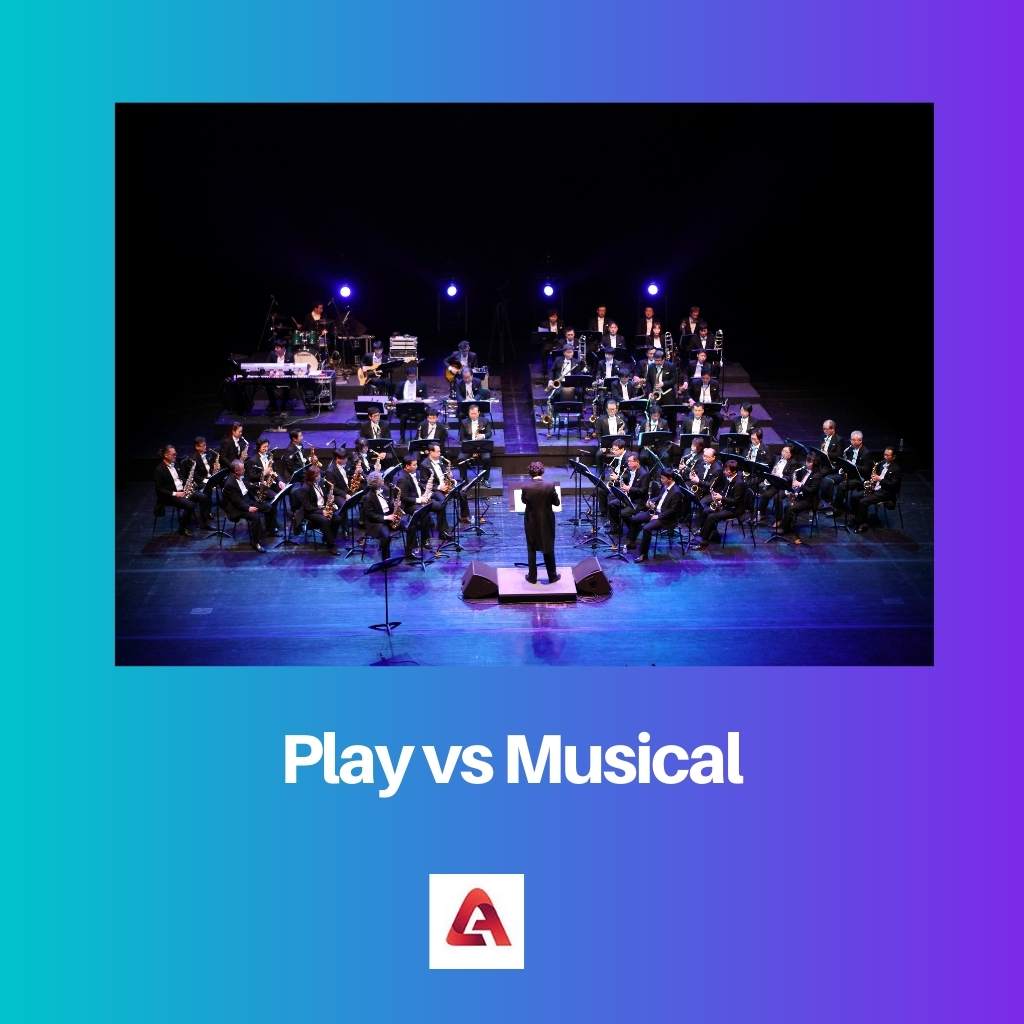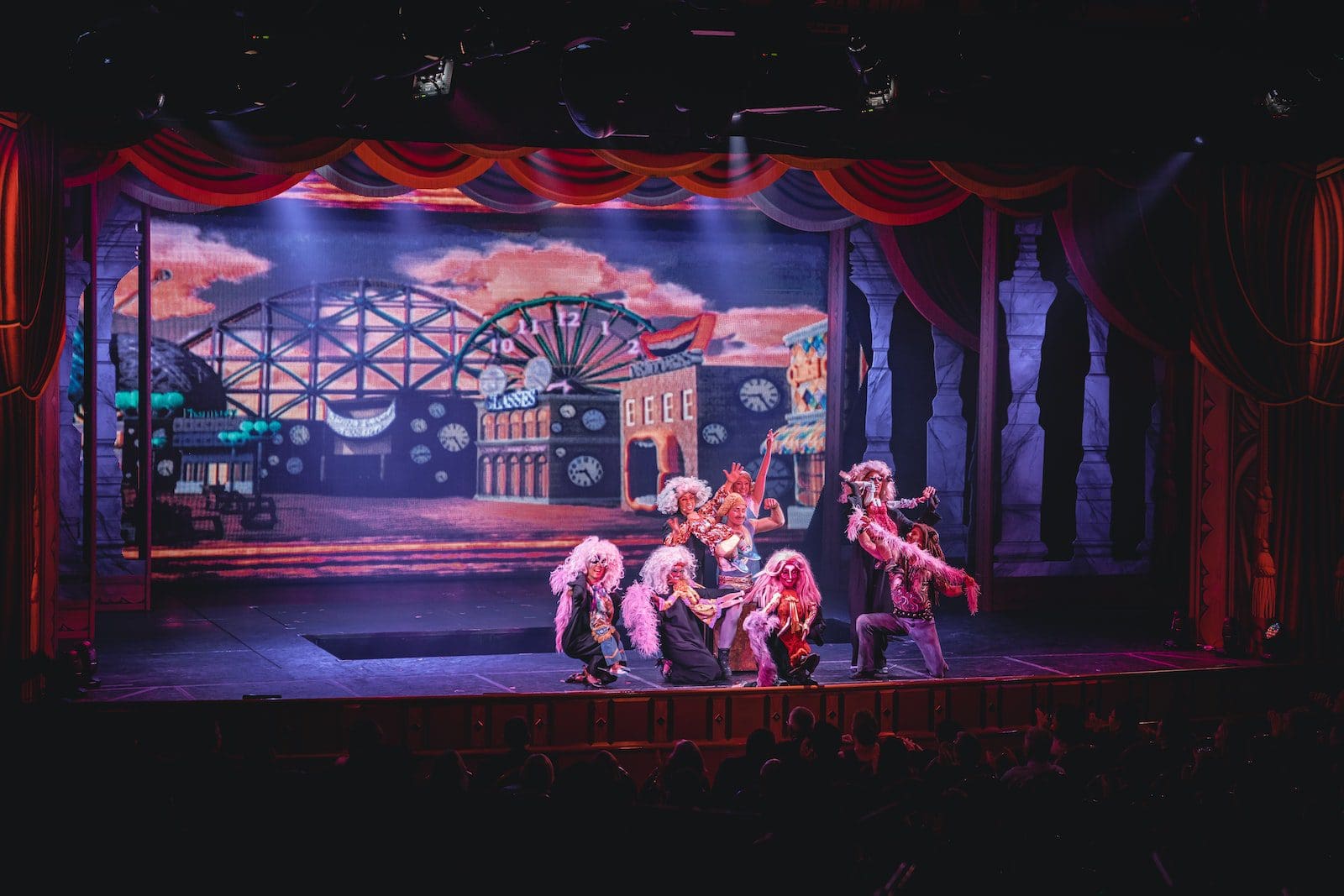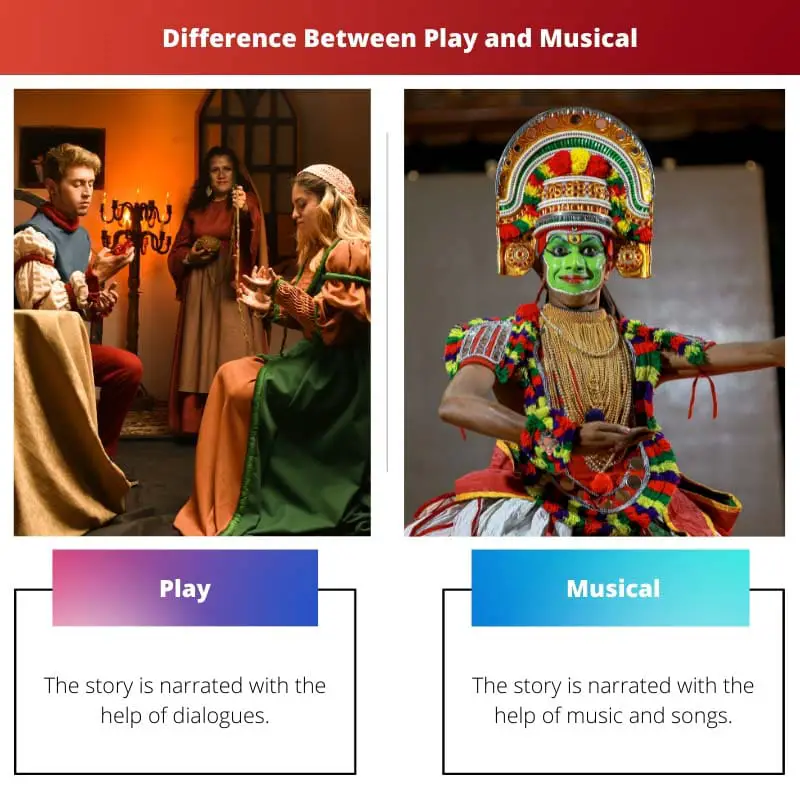The entertainment industry is widely incorporated into people’s lives in this generation. Whether it be a play, movie, drama, or social media, everything contributes meaning when thought of in a specific way. The role of literature is immensely important in building a society and sharing knowledge.
Plays and musicals are ways in which art forms are represented and also act as a source of entertainment for the audience. It also holds great importance for the artist and the crew members working for the same.
Key Takeaways
- Play is a theatrical performance that relies on spoken dialogue and action to tell a story. At the same time, a Musical is a theatrical performance that uses songs and dances to tell a story.
- Play focuses more on character development and dialogue, while Musical focuses more on spectacle and music.
- Play can be performed with minimal or no music, while Musical relies heavily on music and includes elaborate dance numbers.
Play vs Musical
Storytelling through dialogue is called a play. There are multiple elements in a play. Playwriting talent is required in a play. Scripts written for a play can be used for a movie. Storytelling through music is called a musical. Singing and dancing can be done to tell a story in a musical. Musical talent is required, along with playwriting talent in musicals.

A play tells a story through narration, and it may or may not have a narrator who acts as the storyteller. Spoken language, i.e. dialogues, is the main element in the play.
A play has many different elements, like music, dance, and dialogue. A play is performed on stage; sometimes, the script is taken for movies.
A musical tells us a story via music, singing, and dancing. There is no active role of dialogues or say. There is no room for any conversation in this kind of play. Musicals are a representation of music, drama, and dance. The musical has a script, and the story is narrated through songs.
Comparison Table
| Parameters of Comparison | Play | Musical |
|---|---|---|
| Meaning | The story is narrated with the help of dialogues. | The story is narrated with the help of music and songs. |
| Performance | Usually performed on stage. Scripts may also be used for movies. | Performed on stage, on big shows, and also on movie screens. |
| Talents | Playwriting talent is highlighted. | Requires both playwriting and musical talents. |
| Requirements | Manageable as only the actors, background, and costumes are basic requirements. | More management is required due to the presence of a lot of elements. |
| Famous works | Hamlet, Long Day’s Journey Into Night, Death of a Salesman, Angels in America, etc. | Evergreen, The Tale of Hoffman, Look up and Laugh, Ace of Clubs, Everything is Rhythm, etc. |
What is Play?
A play is a form of literature created by a playwright. A play tells a story through narration, and it may or may not have a narrator who acts as the storyteller. Spoken language is the main element in the play.
A play may have different elements, such as music, dance, and dialogue. A play is normally performed on stage and is referred to as a straight play because it is based on a dialogue script.
Music may be incorporated into a play, but it is not the original medium by which the play is displayed or how the plot is communicated. There can be various forms of plays, such as comedies, rom-coms, satirical dramas, and tragedies.
Each type of play is classified into one of the different categories. Shakespeare, the well-known playwright of the sixteenth and seventeenth centuries, wrote many of these types of plays. His famous works include Hamlet and Romeo and Juliet.
The play serves many purposes. They are used as a source of entertainment and as the storyline for the pictures in motion. Play is used as a form of literary writing, which is used in literature in schools and colleges.
Play is an interesting way to express the emotions and situations such as comedy, tragedy, satire, and various other forms of literature.

What is Musical?
A musical tells us a story by means of singing and dancing. There is no active role of dialogues or say. No one is allowed to have a conversation in this kind of play.
In the 19th century, the musical became popular in Britain when a modern structure was brought to the musical by Gilbert and Sullivan. The librettist-composer duo collaborated on fourteen different musicals.
The musical is of two types: Musical theatre and Book musicals. A musical is a kind of play that tells a story through music. The musical may have a script, but the meaning of the story is told by the lyrics of the song or is portrayed through the music.
A musical may be performed as an opera or as a pop musical with popular music.
Musicals are very common in Western culture and are one of the main events of cultural festivals in schools and colleges.
Musicals are popular as films because they consist of a combination of a variety of art forms. Many different audiences enjoy the diversity of art forms and the talent that is portrayed through the art form.
At the Oscars and other annual award ceremonies, prizes are given out for musicals and screen productions.
Musicals are enjoyable and are upbeat because they take a lighter approach towards drama. Musical promotes the active participation of multi-talented actors and actresses in the production. Musicals are a representation of music, drama, and dance.
The musical has a script, and the story is narrated through songs. Musical helps in the combination of different elements such as designing, acting, lighting, music, and dancing.

Main Differences Between Play and Musical
- The play tells us the story through spoken language, i.e. dialogues. The musical tells the story through the use of music, singing especially.
- Play may have action, but the musical tells us a story and does not contain action.
- A musical can be a play with music, but a play cannot be a musical. They will always require a spoken medium in it.
- The story in the play is conveyed using dialogues, while songs portray the story in the musical.
- The play does not include as many elements as the musical.


I never knew there were so many differences between a play and a musical. This article has broadened my understanding.
I found the table comparing plays and musicals very helpful.
That’s the beauty of learning something new! I’m glad the article was able to provide you with new insights.
The article seems to undervalue the storytelling aspects of musicals. It should give more credit to that element.
I see what you mean, Candice. But I think the article does recognize the importance of storytelling in musicals, just in a different way.
I don’t have much knowledge about plays or musicals, but this article has sparked my interest. It’s informative and engaging.
The article gives an extensive overview of the characteristics of both plays and musicals. It’s a valuable source of knowledge for theater enthusiasts.
I find it amusing that the article describes musicals as ‘there is no active role of dialogues or say’. It’s an interesting perspective on musicals.
I see what you mean, Noah. The portrayal of musicals in the article certainly offers a thought-provoking viewpoint.
This article was a wonderful read, with so much valuable information on plays and musicals. It’s a great resource for anyone interested in theater.
Absolutely, Craig! The article is enlightening and precise.
I enjoyed the article, but it would be great to have some real-life examples of famous plays and musicals to better understand the differences.
The absence of examples is quite noticeable, but overall, the article is well-written and educational.
That’s a valid point, Harley. Real-life examples would definitely enhance the understanding of the concepts mentioned in the article.
The comparison table in the article made it very clear to distinguish between plays and musicals. It’s a great summary of the key differences.
I completely agree with you, Ofox. The comparison table was very helpful and insightful.
I couldn’t agree more with the article! It beautifully describes the importance and the differences between plays and musicals.
I feel the same way. The article is very informative and well written.
I don’t think the article does enough to emphasize the value of musicals. It seems to favor plays more.
I respectfully disagree with you, Hunter. The article presents a balanced comparison of plays and musicals.